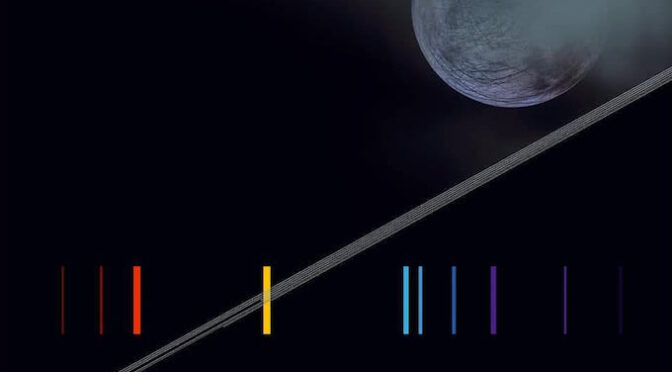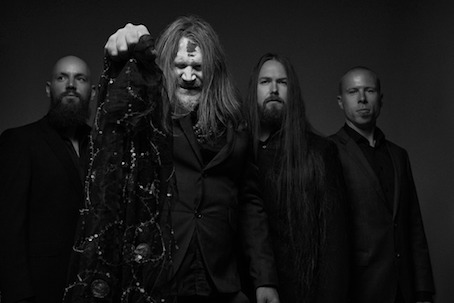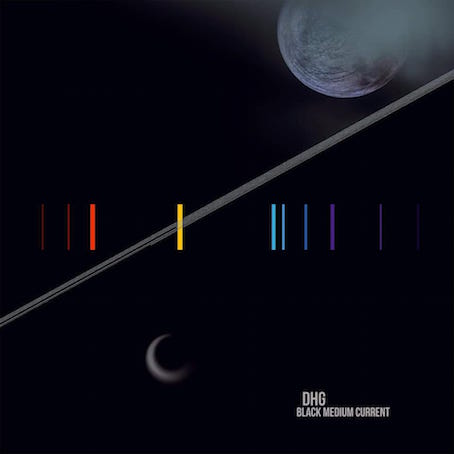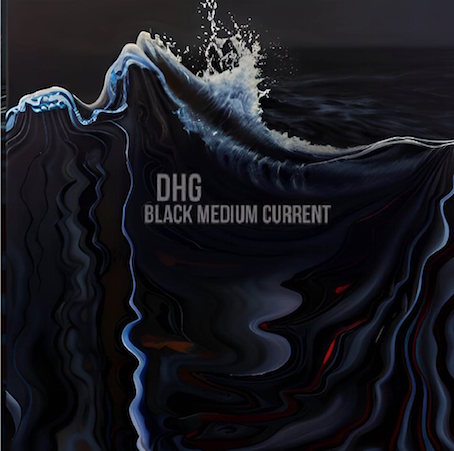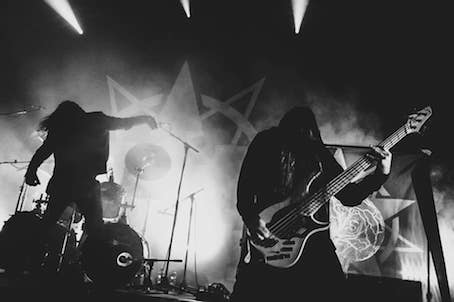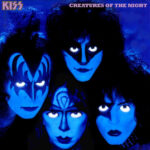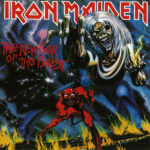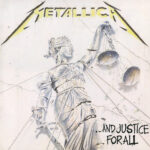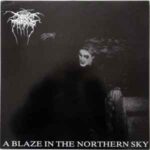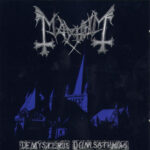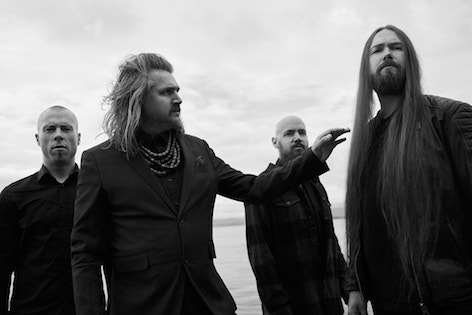EXCLUSIVE: INTERVIEW WITH YUSAF ‘VICOTNIK’ PARVEZ OF DØDHEIMSGARD !!
“In My Opinion Black Metal Has Not Aged Particularly Gracefully.”
DISC REVIEW “BLACK MEDIUM CURRENT”
「自分の芸術が本当に無限のものであるためには、特定の美学に縛られるわけにはいかないと思った。結局のところ、私は芸術を実践したいのであって、説教をしたいわけではないのだから」
原始的で典型的なブラックメタルは、その最高峰のバンド達にとってもはや十分な “乗り物” とは言えないのかもしれません。この悪名高いサブジャンルの冷血なアナーキズムと凍てつくような反妥協主義は、天才的なクリエイターを惹きつけるに十分な魅力ですが、ULVER から ENSLAVED、SIGH に至るまで、その屍を塗りつぶした暗黒のパレットには、拡大する芸術的ニーズを満たすには単にその色が足りないのでしょう。
ノルウェーの地下宮殿を支配した DODHEIMSGARD は今も依然としてアンダーグラウンドな存在ですが、明らかにその “最高峰” リストの筆頭に挙がるべきバンドでしょう。オスロで結成されたこの集団は、今や真のプログレッシブの体現者となり、地獄の業火と宇宙の瞬きを同時に表現するフロンティアを創造しています。90年代前半から中盤にかけての “セカンドウェーブ” のうねりの中で、生々しく重苦しいブラックメタルで影響力を増した DODHEIMSGARD は、その後、画期的なリリースごとに真に多彩な巨人へと進化してきました。9年ぶりに彼らから届けられた7枚目のアルバム “Black Medium Current” は、そんな壮大な暗黒航海の魅力的な最新地点。
「かつて社会は我々を文化的サブグループに属するミュージシャン/アーティストとしては見ていなかった。そうではなく、社会は我々を、唾を吐きかけられ、殴られ、追放されて当然の、ほとんど人間ではない恐ろしい存在として見ていたんだ」
ノルウェーの混沌としたブラックメタル領域、90年代初頭の灰の中で結成され、”Realm Of Death(死の領域) ” と訳される名を誇る彼らの旅は、実に長く険しいものでした。しかし、DHG の首謀者 Yusaf ‘Vicotnik’ Parvez は、犯罪捜査と裁判から始まった茨の道を乗り越えて、ブラックメタルをアートと哲学の領域まで高めることに誰よりも寄与してきたのです。1999年にリリースされた “666 International” では、ブラックメタルにインダストリアルとアヴァンギャルドの大胆な婚姻を加え、それ以来四半世紀に渡って DHG は長大かつ冒険的な作品でシーンの潮流と拡大に影響を与え続けています。
「私の住む地域のブラックメタルは今日、演劇やショーマンシップに近い。それが良いことだとも悪いことだとも言っていない。芸術表現から社会的葛藤を取り除くと、その表現を実践する理由はより自己中心的になる傾向がある。しかし、ほとんどの “練習生” はそうではない。ほとんどのブラックメタル・マンは、箱の中に存在する既存のチャンスに応えることだけで満足している。つまり、コミュニティに属し、音楽を作り、音楽を出版し、コンサートに出演し、注目を浴び、そしておそらくお金を稼ぐ。私の意見では、ブラックメタルは優雅に年をとっていないよ」
“Black Medium Current” の9曲70分に及ぶ濃密で壮大なアートの海に身を委ねれば、Yusaf が切り拓いたブラックメタルの現在が、彼の理想と距離があることにも頷けるでしょう。カオティックな色彩の積み重なった瞬間も、心を揺さぶる宇宙観も、妖艶かつノン・メタルな実験精神も、すべては心の赴くアートのため。生々しいセカンドウェーブの怒りから、エレクトロニカ、インダストリアル、ジャジー、エクスペリメンタルと、彼らのサウンドの軌跡は目撃者にとってスリリングとしか言いようがありません。
奔放な不協和音、不穏な怪しさ、切ないメロディズムの相互作用によって、作品の魅力は存分に高まります。”Black Medium Current” でバンドはジャズ的な実験から距離を置き、エレクトロニカをブラックメタルのフレームに織り込み強調し、クラシック楽器で包みこんでいきました。アルバムに散りばめられた不穏な切迫感に不気味なオーラ、美しいテーマ、サイケデリックな怒りのため息、緊張を解き放つ力強さに奇妙なテンポは、その多感で多様な設計図にもかかわらず、分裂症のような気まぐれさよりも、全体に映画のように統一されたサウンドスケープをもたらしています。そうしてアルバムは、70分の広大な実存的宇宙を旅する冒険で、現実に縫い込まれた信念と心の脆さを探究していくのです。
今回弊誌では、Yusaf ‘Vicotnik’ Parvez にインタビューを行うことができました。「個人的には、悪魔が生きている存在だとは信じていないが、神に対立する存在として、サタンは強力なシンボルだと思う。聖書のサタンもまた、個人の自由を憂慮するリベラルな生き物として、神をはるかに凌駕していると思うんだ」 どうぞ!!
DØDHEIMSGARD “BLACK MEDIUM CURRENT” : 10/10
INTERVIEW WITH VICOTNIK
Q1: You are often referred to as the “Second Wave” of Norwegian black metal. What was the scene like when you first appeared on the scene? Were there any bands or people you were particularly close to or respected by?
【VICOTNIK】: I started my first black metal band in 91. I wasn’t in tons of bands prior to this, so I had only played music for a few months before I started making content that sonically and conceptually aligned with what was defined as black metal music.
The scene back then was multifaceted and divided into many parts one adhered to. One side specific side was related to collecting content. There wasn’t a lot of available, so the scene consisted of international trading communities that made and sent tapes to each other through the postal services. Another aspect was your close circle of friends and what practices you did together, making music, listening to music, writing lyrics, collecting effects, music and attire, taking photo sessions and having various rituals to empower our own community. The black metal scene was overall a cold environment, someone without internal position would have to prove themselves.
But to be fair, the scene was very adolescent, so the rules that applied to it was rather incoherent. The consistency for why someone was accepted as true, and someone rejected as a false person were mostly based on ad hominins, personal feelings, favoritism and the larger group mentality. As an outgroup I think the black metal scene was very empowering and great cultural produce arose from it. As an ingroup it was mostly immature and self-destructive.
At a specific point, most of us “second wavers” were present in the scene simultaneously with the “First Wavers”, but with very few exceptions “second wavers” were excluded from the inner circle. One day, the “First Wave” scene pretty much imploded from the external pressure stemming from past actions, and the second generation inherited the scene.
Another aspect of being a black metal guy back then, was all the ongoing criminal investigations and eventually court cases. So, I guess, like myself, many were brought into interrogations on multiple occasions. In addition, put under surveillance and intimidated by the authorities. As a general outline, the “satanic panic” emanating from the 80s was reinvigorated through much publicized mainly negative attention catching fire in the first couple of years in the 90s. One must have in mind, black metal had no cultural context to be interpreted through at this point, so society didn’t see you as a musician/artist belonging to cultural sub-group. No, society looked at you as a terrible almost non-humans that deserved to be spat upon, beaten up and ostracized. Forgetting the fact that most of us were kids and forgetting that behind the hard surface our complaints were very real and very true social issues. An important point is that society didn’t become hypocritical upon the emergence of black metal, but by in being a bm guy and sort of embracing your role as an outsider, we really got to expose the inequalities and injustices in the social fabric in our local communities.
In addition to being hassled by the authorities, situations like when my headmaster unequivocally told me he didn’t want me there and would work hard to kick me out if I didn’t quit were common. Going out meant accepting you would most probably get abuse from people. I was attacked on 13 occasions during one school semester in 93, when the school evaluated all the situations, I got the blame on every single one of them. Just because! No other reason was needed. Applying for jobs etc. Yeah, good luck with that. But you know what, I loved it, every single bit of it. This is probably the biggest difference between the initial scene and the scene that followed. These struggles are still ongoing, but in other parts of the world.
Q1: DHG はブラックメタルのいわゆる “セカンド・ウェーブ” の代表的なバンドの一つですが、あなたたちが登場したときのシーンを振り返っていただけますか?
【VICOTNIK】: 私が初めてブラックメタル・バンドを結成したのは91年のことだった。それ以前は、たくさんのバンドに所属していたわけではなかったんだ。だから、ブラックメタルと定義される音楽とサウンド的にもコンセプト的にも一致するコンテンツを作り始めるまで、私はまだ数ヶ月しか音楽活動をしていなかった。
当時のシーンは多面的で、多くのパートに分かれていた。ある特定の側面は、コンテンツの収集に関連していた。手に入るものが少なかったので、シーンは国際的な取引コミュニティで構成され、郵便サービスを通じてテープを作り、送り合っていた。もう1つの側面は、親しい仲間たちと、音楽を作り、音楽を聴き、歌詞を書き、エフェクトや音楽、服装を集め、フォトセッションを行い、自分たちのコミュニティに力を与えるために様々な儀式を行っていた。ブラックメタル・シーンは全体的に冷たい環境で、地位がない者は自分自身の価値を証明しなければならなかったんだ。
しかし、公平を期すために言えば、シーンは非常に幼かったため、それに適用されるルールはむしろ支離滅裂だった。誰かが真人間として受け入れられ、誰かが偽人間として拒絶される理由は、ほとんどがアドホミネム (個人攻撃)、個人的感情、好意主義、そして大きな集団心理に基づいていたんだ。アウト・グループとしてのブラックメタル・シーンは非常に力強く、そこから素晴らしい文化的生産物が生まれたと思う。ただし、イン・グループとしては、そのほとんどが未熟で自己破壊的だった。
ある時期、私た”セカンド・ウェーヴァー” のほとんどは “ファースト・ウェーヴァー” と同時にシーンに存在していたが、ごく少数の例外を除いて “セカンド・ウェーヴァー” はインナー・サークルから排除されていた。そしてある日、”ファースト・ウェイヴ” シーンは過去の行動からくる外圧によって崩壊し、第二世代がシーンを継承することとなった。
当時のブラックメタルのもう一つの側面は、現在進行中の犯罪捜査と、最終的には裁判だった。だから私のように、多くの人が何度も取り調べを受けたと思う。さらに、当局の監視下に置かれ、脅迫された。一般的に、80年代から発せられた “悪魔崇拝パニック” は、90年代の最初の2、3年間、主に否定的な注目を集めることによって再燃したんだ。この時点では、ブラックメタルは解釈されるべき文化的文脈を持たなかったので、社会は我々を文化的サブグループに属するミュージシャン/アーティストとしては見ていなかった。そうではなく、社会は我々を、唾を吐きかけられ、殴られ、追放されて当然の、ほとんど人間ではない恐ろしい存在として見ていたんだ。
世界は私たちのほとんどが子供だったという事実を忘れ、私たちの吐き出す不満が硬い表面の裏側にある、とても現実的で、とても真実味のある社会問題であったことを忘れていた。重要なのは、ブラックメタルが出現したからといって、社会が突然偽善的になったわけではないということだ。しかし、ブラックメタル・マンになり、アウトサイダーとしての役割を受け入れることで、私たちは地域社会の社会構造における不平等や不公正を暴くことができた。
役所からの嫌がらせだけでなく、学校の校長からはっきりと “お前は必要ない、辞めなければ追い出す” と言われたような状況もよくあった。外に出るということは、おそらく人から罵倒されることを受け入れるということだった。私は93年の1学期に、一学期の間だけだよ、13回攻撃を受けた。しかし学校側がすべての状況を評価したところ、すべての責任は私にあると。ただブラックメタルをやっている、それだけの理由でね!それ以外の理由は必要なかった。就職活動なんかも、”うん、頑張ってね” でおわり。でもね、私はそれが大好きだったよ。そこが最初のシーンとその後のシーンの最大の違いだろう。こうした闘いは今も続いているが、世界の他の地域の話だ。
Q2: At the time, the Second Wave was noted for its intense music, but also for sensational incidents such as inner circles, arson, and murder. How did you view those situations?
【VICOTNIK】: Well, in retrospect, I am not sure how much weight we should put on the murders, here in Norway as an intrinsic part of what black metal culture is. It is true that these murders happened in the scene by people involved in the scene, but I am less sure they happened because of some trope tied to the tenets of black metal. For one, most black metal guys didn’t end up murdering people. The murder in Oslo has no mechanism pertaining to philosophical positions or moral quandary that that is inherent to black metal. If we break it down, it’s just about a spoiled kid who travelled to Oslo and stabbed his former best friend in the back over influence, album rights and money. So, this is just a historical characteristic tied to black metal. To differ, the arsons are both a historical, but also a motivation cultivated from the essence of what is intrinsic to black metal. In other words, it’s a culminated response from what spurred the cultural expression in the first place.
Q2: 当時、シーンはその刺激的な音楽だけでなく、殺人や教会への放火でも注目を集めていました。
【VICOTNIK】: 振り返ってみると、ここノルウェーで起きた殺人事件を、ブラックメタル文化の本質的な部分として、どの程度重視すべきかはわからない。ああした殺人が、我々のシーンで、シーンに関わる人々によって起こされたことは事実だが、私にはブラックメタルの信条に結びついた何らかの図式のために起こったとは思えないんだ。ひとつには、ほとんどのブラックメタル・マンは殺人にまで至らないからだ。
それにオスロでの殺人は、ブラックメタルに内在するような哲学的な立場や道徳的な苦境に関わるメカニズムを持っていない。噛み砕いて言えば、オスロに旅した甘やかされたガキが、影響力、アルバムの権利、金を巡って、かつての親友を後ろから刺しただけの話だ。つまり、これはブラックメタルに結びついた一つの歴史的側面にすぎない。ただ、違う言い方をすれば、放火は歴史的なものであると同時に、ブラックメタルに内在する本質から培われた動機でもある。言い換えれば、そもそも文化的表現に拍車をかけたものからの集大成的な反応なのだ。
Q3: You guys have been pushing in an avant-garde direction since “666 International”, haven’t you? Why did you decide to move forward from “normal” black metal?
【VICOTNIK】: It’s sort of the other way around. The thing is, I started playing black metal in 91, but I didn’t get the chance to release any content until 94-95. By 93, Carl and I started Ved Buens Ende which pretty much defined as an avant-garde act today. Which means my creative efforts had already moved forward from the more primitive form of BM by 93. Come 94, I really missed performing this form of bm, and since I never got to release anything from my most early years of music making, Dhg was pretty much created as a response to that. I cannot speak for anyone else but making one album like this was for me kind of enclosing culmination and representation of those years ranging from 91 to 94.
Q3: 音楽的に、あなたたちは 99年の “666 International” から、典型的なブラックメタルからアヴァンギャルドなブラックメタルに進化を遂げましたよね?
【VICOTNIK】: というか、その逆なんだ。91年にブラックメタルを始めたんだけど、94年から95年にかけてはコンテンツをリリースする機会がなかっただけなんだよ。93年には、Carl と私は Ved Buens Ende を立ち上げ、今日のアヴァンギャルドな活動を定義した。つまり、私の創作活動は、93年にはすでにブラックメタルの原始的な形から前進していたということだ。ただ、94年になると、この形態のブラックメタルを演奏するのが本当に恋しくなり、最も初期の頃の音楽制作から何もリリースすることができていなかったので、DHG はそれに対する回答として作られたんだ。他の人のことは言えないけど、このようなアルバムを1枚作ることは、私にとって91年から94年までの集大成であり、表現だったんだ。
Q4: The current black metal scene is very diverse, not only in terms of music, but also in terms of themes, with some bands moving away from devil worship and dealing with the natural environment and transgenderism. Obviously, you were the “catalyst” for this diversity, but how do you feel about the scene today?
【VICOTNIK】: Well, don’t know how many bands over here actually deal with topics such as environment and transgenderism to be honest.
In Norway, I think there were a lot of bands that never actually flirted with satanism in the first place. A great deal of “Pagan”/” Viking” bands and loads of nature and folklore worship came from these shores.
To try to count for those bands that did move away from satanism, the reasons are probably vast and many. For one, most bands were never satanists in the first place. Secondly, I think a few bands just broadened the scope of their interests and beliefs. Not exactly distancing themselves from the past but adding more connotations to their productive outcome. At some point, a specific dogma becomes equally flawed as the opposing dogma, and as people got older it became easier to identify the flaws in one’s justification and reasoning. Belief is not a good pathway to truth.
I also felt for my art to really be boundless it couldn’t be pigeonholed to one specific set of esthetics. Ultimately, I want to practice art, not preach.
There are also numerable practices of satanism, so the term itself is a bit flimsy. But to be fair you did not use the term satanism, you said devil worship. I will say that I have never met anyone that I consider seriously believes in and worships the devil, except Christians that is. If one takes the historicity of devil seriously seen from a sociological sense, the devil’s role has changed a lot over the centuries. The serpent in the garden of Eden is never named Satan but has gotten to represent the serpent over the years of the development of Christian theology. Satan initially was considered an entity that pretty much was part of gods administration. Testing people’s devotion to god but doing so favoring the omnipotent will of god. In the Middle Ages, the devil didn’t play much of a role and was mostly used as comic relief within Christian circles. In the late Middle Ages, Satan was given a much more prominent role with the increased belief of demonic possession and witchcraft.
In the modern world we have continued to interpret the devil into several theistic and atheistic satanic practices which are further fragmented into different small philosophical and/worshiping groups.
Personally, I do not believe in the devil as a living entity, I do think though, that as a opposed to god, Satan is a powerful symbol. Seeing that the Satan of the bible also by far exceeds god as a liberal creature that seems concerned about personal freedom, it’s easy to see why Satan can be made into a dynamic figure/symbol in today’s society. Seen through a modern lens, it is almost impossible to interpret the god of the bible as anything other than vain, moody, selfish, sadistic and cruel god and thus Satan rises as a symbolic entity seemingly more worthy of worship. Throwing gods features into the fold: Being the first singular cause, eternal, omnipotent, omniscient and omnipresent, god by is by default the cause of evil. One can argue that god had to create evil as a means to contrast it to moral values, but considering the fact children get raped and killed every day, children die of terrible diseases every day etc. etc. And that god is ultimately responsible, the ideal of benevolent and a just god is crumbles under these set of circumstances. When we add into this notion the power the Abrahamic god-idea wields in the real world, one of the important tenets is to oppose this depraved power and fight for the separation of church and state and other freedoms infringed upon by dogmatic practices.
Q4: 一方で、近年のブラックメタル・シーンはその音楽だけでなく、扱うテーマや哲学まで非常に多様で、自然崇拝からトランスジェンダーイズム、ネイティブ・アメリカンに神の世界まで様々です。DHG はそうしたシーンのカタリスト、触媒であったと思うのですが…?
【VICOTNIK】: まあ、正直なところ、こっちで環境やトランスジェンダーといったトピックを実際に扱っているバンドがどれだけいるかはわからないよ。
ノルウェーでは、そもそも悪魔崇拝とは無縁のバンドが多かったと思う。多くの “異教徒”/”ヴァイキング” バンドや、自然崇拝、フォークロア崇拝のブラックメタルがこの国から生まれたからね。
悪魔崇拝から離れたバンドをみてみると、その理由はおそらく膨大で、たくさんある。ひとつは、ほとんどのバンドはもともと悪魔崇拝者ではなかったということだ。次に、いくつかのバンドは自分たちの興味や信念の範囲を広げただけだと思う。過去から距離を置くというわけではないが、彼らの生産的な結果に、より多くの意味合いを加えたというかね。ある時点で、特定のドグマは対立するドグマと同等の欠陥を持つようになり、人々が年を取るにつれて、自分の正当性や推論の欠陥を特定することが容易になった。信念は真理への良い道筋ではない。
私はまた、自分の芸術が本当に無限のものであるためには、特定の美学に縛られるわけにはいかないと思った。結局のところ、私は芸術を実践したいのであって、説教をしたいわけではないのだから。
サタニズムにもいろいろあるから、この言葉自体が少し薄っぺらいよな。しかし、公平を期すために、サタニズムよりも悪魔崇拝というべきだろう。私は、本気で悪魔を信じて崇拝している人に会ったことがない。社会学的な観点から悪魔の歴史性を真剣に考えるならば、悪魔の役割は何世紀にもわたって大きく変化してきた。エデンの園の蛇は決してサタンとは名付けられなかったが、キリスト教神学の発展の過程で蛇を象徴するようになった。サタンは当初、神の支配の中の一部であると考えられていた。人々の神への献身をテストするが、そうすることで神の全能の意志を支持するとね。中世では、悪魔はそれほど重要な役割を果たすことはなく、キリスト教界ではコミックリリーフ (滑稽な登場人物) として使われることがほとんどだった。それから、中世後期には、悪魔憑きや魔術の信仰が高まり、サタンはより重要な役割を担うようになった。
現代世界では、悪魔はいくつかの神道的、無神論的な悪魔崇拝に解釈され続け、それらはさらにさまざまな小さな哲学的、崇拝的グループに細分化されている。
個人的には、悪魔が生きている存在だとは信じていないが、神に対立する存在として、サタンは強力なシンボルだと思う。聖書のサタンもまた、個人の自由を憂慮するリベラルな生き物として、神をはるかに凌駕していると思うんだ。だから現代社会においてサタンが、個人の自由と言う意味においてダイナミックなシンボルとなり得るのは理解できるよ。現代のレンズを通して見ると、聖書の神をうぬぼれ屋で気分屋で利己的でサディスティックで残酷な神以外のものとして解釈することはほとんど不可能であり、それゆえサタンは、より崇拝に値すると思われる象徴的存在として立ち上がる。神々の特徴とは、永遠であり、全能であり、全知全能である。そして神はデフォルトで悪の原因なんだ。
道徳的価値観と対比させる手段として、神は悪を創造しなければならなかったと主張することもできるが、子供たちが毎日レイプされて殺され、子供たちが毎日恐ろしい病気で死んでいる事実などを考えれば、そうではない。神には最終的な責任があり、慈悲深く公正な神という理想は、このような状況下では崩れてしまう。この考え方に、アブラハムの神イデアが現実世界で振るう権力を加えると、サタニズムの重要性はこの堕落した権力に反対し、政教分離や教条主義によって侵害されるその他の自由のために闘うことにちがいない。
Q5: Well, “A Umbra Omega” was a revolutionary and wonderful work that received rave reviews in various places. Now, eight long years have passed since then, and you have finally released your new album. What was the reason for this long period of time?
【VICOTNIK】: The reasons are many and intertwined. I always need a sort of breakdown of practice which reverses back into thinking. While thinking about what the next path is, I often also commit to other projects. Add to this that I have three bands in the live circuit, in addition I have a “normal” life with its proportionate parts and pieces. All in all, time flies.
Q5: さて、”A Umbra Omega” は革命的で素晴らしい作品で、各所で絶賛されました。最新作まで、あれから8年という長い月日が流れましたね?
【VICOTNIK】: 理由はたくさんあるし、絡み合っている。私はいつも、思考を逆転させるような練習の中断を必要としている。そうして次の道について考える一方で、他のプロジェクトに取り組むことも多い。それに加えて、私は3つのバンドをライブサーキットで演奏しているし、同時に “普通の” 生活も送っているからね。すべてが、時間はあっという間に過ぎていく。
Q6: What is the meaning behind the title “Black Medium Current?” You are connected to the universe. What is your concept for this record?
【VICOTNIK】: Black Medium Current is an analogy of a surge of every psychological notion that is experienced as “dark” as an existing, specific and located source. As an idea that these things exist separate from the mind that experiences them, and that forms behaviorisms from them.
This further ties into the broader concept of the album. Determinism vs free will, mentalism and behaviorism through reminiscence and suffering. I wanted to define certain moods we have in our brains and try to make music that would reflect these moods. It is also important to me, that once I have identified and re-created these moods, they should ultimately be experienced by the listener where the he or she interpret these meta-states through their own notion of existence.
Q6: “Black Medium Current” というタイトルを選んだのはなぜだったんですか?
【VICOTNIK】: “Black Medium Current” は、”暗い” と経験されるあらゆる心理的観念が、存在し、特定され、所在する源として押し寄せてくることのアナロジー (類推) なんだ。暗さが、それらを経験する心とは別に存在し、そこから行動主義を形成するという考えだね。
これはさらに、このアルバムのより広いコンセプトと結びついている。決定論対自由意志、回想と苦悩を通じたメンタリズムと行動主義。私は、私たちの脳の中にある特定のムードを定義し、そのムードを反映するような音楽を作りたかった。また、私がこれらのムードを特定し、再現した後は、最終的にリスナーが自分の存在概念を通してこれらのメタ状態を解釈し、それを体験することが重要だと考えている。
Q7: This time around, in particular, I feel that you are steering more toward an electronica and classical journey rather than jazz-leaning experimentation. How did you decide on the direction of such works?
【VICOTNIK】: My direction was initially homing in on the moods. What means I used to create these moods were secondary and to some degree arbitrary. Nevertheless, it is easier to get results if you work somewhat within the parameters of your own abilities right. So, through the capacities and limitations you have, it helps define what the album will not turn out to be. To serve you a concrete example; I don’t know how to play the harp, nor do I have any easy access to it, so the probability for harps to be present on the album is an initially small and ever diminishing prospect the further we come down the process. I am not that an accomplished musician, but I am pretty good with ideas, making good use of the abilities I have, and I dare to go where the ideas take me.
Q7: 今回のアルバムは、ジャズ的な実験よりも、エレクトロニカやクラシカルへと傾いていますよね?
【VICOTNIK】: 私の方向性が、最初そのムードに焦点を合わせていたからね。これらのムードを作り出すためにどのような手段を使ったかは二の次で、ある程度恣意的だった。とはいえ、自分の能力のパラメーターの範囲内で作業した方が、結果を出しやすい。だから、自分の持っている能力と限界を通して、アルバムがどうならないかを定義するのに役立つ。
具体的な例を挙げると、私はハープの弾き方を知らないし、ハープを簡単に手に入れることもできない。一方で、私はそれほど熟練した音楽家ではないが、自分の持っている能力をうまく利用し、アイデアを出すのは得意だ。
Q8: I think you have come a long way from the original definition of black metal, but is it still important to be black metal? What are your thoughts on black metal gatekeepers?
【VICOTNIK】: Black metal is very dear to me. It is intertwined with the experiences of both my inner and outer experience of existence. On the other hand, do I think seeing yet another band wielding the corpse-paint as a powerful statement today? No, not at all. Unless you are from Iran or some other countries were wearing CP can have consequences for you, I really don’t. In my very honest opinion, black metal in my part of the world is more akin to theatre and showmanship today. I am not saying that’s a good thing or a bad thing, I am just saying it is what it is. When you remove the social struggle from an artistic expression the reason for practicing this expression tends to become more self-centered. From here, you will still have the means to influence and further it, but most practitioners don’t. Most are happy just to cater to the already existing opportunities that reside within the box. Which is something along the lines of: belonging to a community, making music, publishing music, playing concerts, getting attention and perhaps also earning some money.
In my opinion black metal has not aged particularly gracefully.
Q8: 音楽的には典型的なブラックメタルからは随分と遠い場所まで来ましたが、それでもあなたにとってブラックメタルであることは今でも重要なのですか?
【VICOTNIK】: ブラックメタルは私にとってとても大切なものだ。ブラックメタルは、私の存在の内面と外面の両方の経験と絡み合っている。その一方で、また別のバンドがコープス・ペイントをひけらかすのを見て、今日、力強い声明だと思うだろうか?いや、まったく違う。イランや結果的に自身に影響を与える可能性がある他の国の出身でない限り、コープスペイントを身につけることはもはやファッションなんだ。
率直な意見だけど、私の住む地域のブラックメタルは今日、演劇やショーマンシップに近い。それが良いことだとも悪いことだとも言っていない。芸術表現から社会的葛藤を取り除くと、その表現を実践する理由はより自己中心的になる傾向がある。しかし、ほとんどの “練習生” はそうではない。ほとんどのブラックメタル・マンは、箱の中に存在する既存のチャンスに応えることだけで満足している。つまり、コミュニティに属し、音楽を作り、音楽を出版し、コンサートに出演し、注目を浴び、そしておそらくお金を稼ぐ。
私の意見では、ブラックメタルは優雅に年をとっていないよ。

